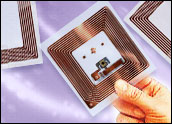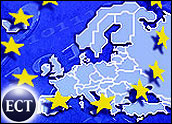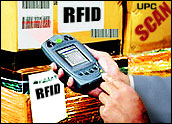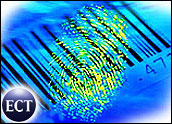
A number of companies — start-ups and established firms alike — are eying the organic RFID tags market. Venture capital firms, like ITU Ventures, are placing seed investment bets on developers with patented prototypes. But despite the hype, the goal of a Radio Frequency Identification (RFID) tag that costs a penny or less is as elusive as ever, experts said.
“There are a lot of pilot projects going on now — and the driving force is cheaper tags,” said Rebecca Wettemann, vice president of research at Nucleus Research, an IT analysis firm, based in Wellesley, Mass. “They don’t just want to tag a pallet, they want to tag a head of lettuce with a sell-by date.”
Some of the biggest names in American business, and the newest names, are involved in the great RFID organic tag race. At NCR, researchers are producing inlaid RFID tags on a roll of paper, Ellen Boerger, director of RFID for the Dayton, Ohio-based company said.
R&D for RFID
“There is a lot of R&D with RFID tags,” said Boerger. “Currently, we have label converting equipment up and running and are getting really, really high percentages of inlays on a roll — 98-99 percent. A lot of people are working on that.”
The company is exploring what kinds of conductive inks are best in printed RFID labels, what the best processes of manufacturing them are, and whether the organic tags can actually replace silicon-based circuits in the future. The company is also examining what adhesives are best to use with the labels. “We’re not talking about active tags here now,” said Boerger. “These are passive, UHF [ultra-high frequency] tags.”
Boerger said that she thinks that “several leaps in technology” are still needed to get the technology to the point where it costs 1 cent per tag, or less, and where it can be used on individual items for inventory tracking and management.
Race for Cheaper Tags
Across the country, in Colorado Springs, Colo., a start-up called OrganicID has developed a prototype of printable, organic RFID tags. The company is working in partnership with International Paper, and has received “a sizeable seed investment” from ITU Ventures, as it seeks to develop tags that cost less than 5 cents each, said Klaus Dimmler, co-founder, president and CEO of the firm. Prices for conventional chips can be as high as 66 cents, depending upon the application, today.
The deal with International Paper brings the RFID industry “one step closer to developing a tag that will one day be incorporated into packages much more easily and efficiently than silicon tags,” said Dimmler, long associated with the University of Texas at Austin, and considered by many to be a foremost expert in the organic electronics industry in the world. “This will open the door for cost-efficient, item-level tracking,” he said.
The technology being developed by OrganicID is a tag that does not use a battery, but one which obtains its energy from the electro-magnetic field generated by a carrier signal emitted by a reader. Energy is transferred inductively, which couples the antennae on the reader with the antennae on the tag, experts said. The tags communicate at 1356 megahertz on the radio spectrum. Paper-based transistors can accommodate data registers of eight bits, and 14 bits, thus far. These paper-based transistors are also known by the name of plastic electronics, especially if they use conductive polymers, or organic molecules on a plastic substrate, to hold and transmit data. Companies active in the plastic electronics field include 3M, AMD, Dow Chemical, Dow Corning, DuPont, and others. Siemens AG and Kurz GmbH KG are also collaborating on making electronics on newsprint in Germany.
What About Bar Codes?
Not so fast, say the skeptics, however. Pouring millions of dollars into the development of organic RFID tags and projects just might be a massive, industry-wide failure, akin to the flop that the wireless industry encountered with Wireless Application Protocol (WAP) during the 1990s, said Dave Rensin, president of Herndon, Va.-based Reality Mobile, an IT consulting company. “This fits the unified theory of technology failure,” said Rensin. “Whenever you see an industry poised to put millions of dollars in a project over several years, you know you are going to guarantee a failure.”
Rensin, whose company works with the federal intelligence agencies, as well as corporate clients, in the Fortune 500 space, said he does not understand the industry’s obsession with creating new passive tags, whether they are organic or silicon. “Bar codes cost almost nothing to print out on paper now,” he said. “You can get an SKU [stock keeping unit] and a description of an item in there.”
Rensin also said that even if paper-based, organic tags were developed for the mass market, they would cause massive problems for the back-end of the supply chain. “The problem with RFID is not a first mile challenge, it is a back-end challenge,” said Rensin. “There will be problems with bad readings, or no readings, of the tags. That will create errors throughout the supply chain that will only multiply.”
Software developers don’t think that the technology is there, on the back-end, to ensure that massive errors are not common in the warehouse when every product is tagged with RFID, not just pallets.
“You are going to have to change the processes in warehouses so that a forklift operator cannot pick up an SKU [stock keeping unit] that is not from their area,” said Brent Forden, alliances manager, Provia Software, based in Grand Rapids, Mich. “You have to make it so that they cannot progress to the next area of the warehouse if they pick up a product they are not supposed to pick up.”


















































